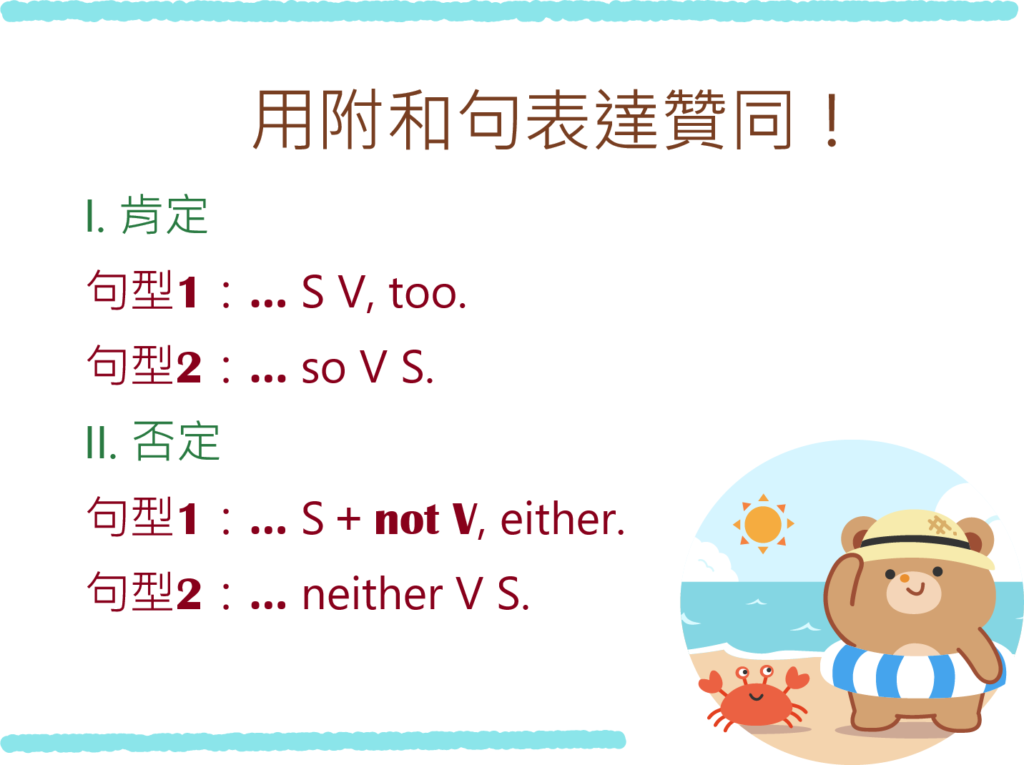附和句 |3分鐘學會怎麼分too, so, either和neither
附和句 用於表示對對方的意見表示贊同,依據句意,分為肯定附和與否定附和。肯定附和有「肯定句 + too」和「so + 倒裝結構」二種用法,意思是「…也是」。否定附和是「否定句 + either」和「neither + 倒裝結構」二種用法,意思是「…也不」。
附和句在日常生活中很常用到。練習完so和neither在句首的倒裝句,可以接著學習only在句首的倒裝句和否定副詞在句首的倒裝句,都是一樣的用法喔!

附和句 用法
I. 肯定 附和句
- 句型1:S V, and S V, too.
- 句型2:S V, and so V S.
- 肯定附和句用於表示對前面句子有相同的肯定看法,可用too或so表達。
- too意思是「也」,放在句尾,使用, and S V, too的結構,前面須加逗點。
- so意思是「也」,搭配倒裝句,使用and so+V+S的結構。
- 附和句使用簡答模式,動詞必須與前句的動詞同形式、同時態,動詞的單複數則由附和句本身的主詞決定。
- 附和句的動詞:
| 主要動詞 | 附和句 |
| be動詞 | be動詞 |
| 助動詞can/will/should等 | 助動詞can/will/should等 |
| 完成式have等 | 完成式have等 |
| 一般動詞 | do/does/did |
David is intelligent, and his brother is, too.
= David is intelligent, and so is his brother.
(大衛很聰明,他的兄弟也很聰明。)
→ 前句為be動詞,附和句也用be動詞。
→ too置於句尾,so置於附和句的句首,因此必須加倒裝結構V S。
These men are the graduates of this school, and their parents are, too.
= These men are the graduates of this school, and so are their parents.
(這些男士是這所學校的畢業生,他們的父母也是。)
→ 前句為be動詞,附和句也用be動詞。
→ too置於句尾,so置於附和句的句首,因此必須加倒裝結構V S。
The professional swimmer can swim very fast, and his teammates can, too.
= The professional swimmer can swim very fast, and so can his teammates.
(職業游泳運動員可以游得很快,他的隊友也可以。)
→ 前句為助動詞can,附和句也用助動詞can。
→ too置於句尾,so置於附和句的句首,因此必須加倒裝結構V S。
Ms. Lee will move to the south, and her best friend will, too.
= Ms. Lee will move to the south, and so will her best friend.
(李小姐將搬到南方,她的好友也將會。)
→ 前句為助動詞will,附和句也用助動詞will。
→ too置於句尾,so置於附和句的句首,因此必須加倒裝結構V S。
要在30分鐘內寫完漂亮作文、翻譯得6-8分,絕對需要強大的作文寶典+實用的句型、翻譯書。推薦博客來網路書店:
🎯 作文:超核心大考英文寫作(寂天):由基礎到高階的順序開始,分為八大單元,一步步教授寫作技巧,提供重點字彙與主題模版,搭配練習可仿寫,適合從基礎寫作框架開始架構者。
🎯句型:大考英文句型GO(三民):這本書列出所有大考中常見與易混淆的句型,分成16章節,每小節都有大考實例與經典例句,搭配詳細用法講解與不同題型的練習,並有隨堂評量附冊馬上檢測成效,是增進翻譯與寫作的超強工具書!大力推薦!
🎯 作文:迎戰108新課綱:英文作文必考題型各個擊破(常春藤):教授基本到高階的寫作技巧、不同類型與主題的文體、針對五大題型「圖表、看圖、書信」等。內容多元、完整,提供大量題目與範文。
🎯 翻譯:大考翻譯實戰題本:以主題為單元,題目兩兩一組,依照大考方式出題,提供漂亮詞彙與實用句型。
The baby has slept for three hours, and her grandma has, too.
= The baby has slept for three hours, and so has her grandma.
(寶寶睡了三個小時,她祖母也是。)
→ 前句為完成式has,附和句也用完成式has。
→ too置於句尾,so置於附和句的句首,因此必須加倒裝結構V S。
Some birds migrate, and some whales do, too.
= Some birds migrate, and so do some whales.
(有些鳥會遷徙,有些鯨魚也會遷徙。)
→ 前句為一般動詞migrate,附和句用助動詞do。
→ too置於句尾,so置於附和句的句首,V的單複數與S一致。
The kids love sugary food, and their mother does, too.
= The kids love sugary food, and so does their mother.
(這些孩子們喜歡含糖食物,他們媽媽也喜歡。)
→ 前句為一般動詞love,附和句用助動詞does。
→ too置於句尾,so置於附和句的句首,V的單複數與S一致。
II. 否定 附和句
- 句型1:S not V, and S isn’t/can’t/haven’t/don’t, either.
- 句型2:S not V, and neither V S.
- 否定附和句用於表示對前面句子有相同的否定看法,可用either或neither表達。
- either意思是「也不」,放在句尾,使用「and S + 否定動詞, either」的結構。
- neither意思是「也不」,搭配倒裝句,等於not … either,本身已經是否定的意思,因此使用「and neither+V+S」的結構。注意,neither後的動詞不需要再用否定形。
- 附和句使用簡答模式,動詞必須與前句的動詞同形式、同時態,動詞的單複數則由附和句本身的主詞決定。
I am not good at math, and my sister isn’t, either.
= I am not good at math, and neither is my sister.
(我不擅長數學,我姐姐也不擅長。)
→ 前句為be動詞,附和句也用be動詞。
→ either置於句尾,neither置於附和句的句首,加倒裝結構V S。
Sandra is not going to the conference, and her colleague isn’t, either.
= Sandra is not going to the conference, and neither is her colleague.
(Sandra不參加會議,她的同事也不參加。)
→ 前句為be動詞,附和句也用be動詞。
→ either置於句尾,neither置於附和句的句首,加倒裝結構V S。
The students didn’t hear the bell ring, and the teacher didn’t, either.
= The students didn’t hear the bell ring, and neither did the teacher.
(學生們沒有聽到鈴聲,老師也沒有。)
→ 前句為didn’t,附和句也用did。
→ neither已經是否定意思,後面不需再加否定意思。
→ either置於句尾,neither置於附和句的句首,加倒裝結構V S。
Amy has never been to Japan, and her brother hasn’t, either.
= Amy has never been to Japan, and neither has her brother.
(Amy從未去過日本,她弟弟也沒有。)
→ 前句為has never been,為否定意義,附和句也用hasn’t。
→ neither已經是否定意思,後面不需再加否定意思。
→ either置於句尾,neither置於附和句的句首,加倒裝結構V S。
✏️牛刀小試 [正解在最後]
I. 練習
- Terry is going to take photography lessons, and ______.
(A) his sister will, too
(B) so is his sister
(C) so does his sister
(D) his sister does, too - A: I don’t agree with Victoria. B: _______
(A) I don’t agree, either.
(B) Neither don’t I.
(C) Neither do I.
(D) I am not, too. - These volleyball players seem to be tired, and so _______.
(A) has their coach
(B) seems their coach
(C) is their coach
(D) does their coach - Phil還沒看過這部新電影,他的同學也都還沒。
_________________________
🔑 正解:
- (B)
- (C)
- (D)
- Phil hasn’t watched this new movie yet, and neither have all his classmates.